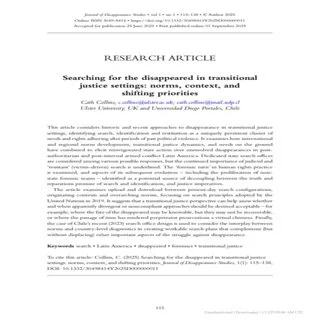By Cath Collins
This article considers historic and recent approaches to disappearance in transitional justice settings, identifying search, identification and restitution as a uniquely persistent cluster of needs and rights adhering after periods of past political violence. It examines how international and regional norm development, transitional justice dynamics, and needs on the ground have combined to elicit reinvigorated state action over unresolved disappearances in post-authoritarian and post-internal armed conflict Latin America. Dedicated state search offices are considered among various possible responses, but the continued importance of judicial and ‘resistant’ (victim-driven) search is underlined. The ‘forensic turn’ in human rights practice is examined, and aspects of its subsequent evolution – including the proliferation of non-state forensic teams – identified as a potential source of decoupling between the truth and reparations promise of search and identification, and justice imperatives.
The article examines upload and download between present-day search configurations, originating contexts and overarching norms, focusing on search principles adopted by the United Nations in 2019. It suggests that a transitional justice perspective can help assess whether and when apparently divergent or noncompliant approaches should be deemed acceptable – for example, where the fate of the disappeared may be knowable, but they may not be recoverable, or where the passage of time has rendered perpetrator prosecutions a virtual chimera. Finally, the case of Chile’s recent (2023) search office design is used to consider the interplay between norms and country-level diagnostics in creating workable search plans that complement (but without displacing) other important aspects of the struggle against disappearance.
Journal of Disappearance Studies, 1(1), 115-138. Retrieved Oct 6, 2025,



